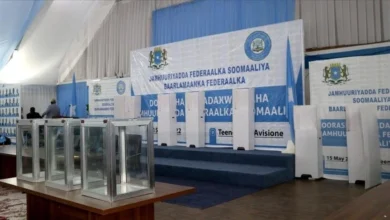Prime Minister Abiy Ahmed inaugurates Grand Ethiopian Renaissance Dam that will initially generate 750MW of electricity
Prime Minister Abiy Ahmed inaugurates Grand Ethiopian Renaissance Dam that will initially generate 750MW of electricity

The Grand Ethiopian Renaissance Dam (GERD) on the Nile went operational after the Ethiopian prime minister inaugurated it on Sunday.
Prime Minister Abiy Ahmed Ali, accompanied by higher officials, senior military officers, and eminent personalities, cut the ribbon inaugurating the $5billion hydro project in a ceremony broadcast live on local TV channels.
The GERD, Ethiopia’s flagship project being built solely through money raised by citizens, will be initially generating 750 megawatts of electricity of the project’s 6,000 megawatts installed capacity that will be achieved within five to seven years when the dam’s reservoir gets full to its 70 billion cubic meters capacity.
At present, the reservoir holds 18.5 billion cubic meters of water through impounding during the past two consecutive main rainy seasons of June, July, and August. Forest clearing for the third impounding is well underway.
The GERD is a 1.8-kilometer (1.1 miles) wide and 147-meter (482-foot) tall dam and currently Africa’s largest hydro scheme that is expected to boost Ethiopia’s electricity power supply.
About 60% of the Ethiopian population lives in the dark at present. A power interconnection scheme also makes it possible for the Horn of Africa nation to sell electricity to neighboring countries.
After getting fully operational in five to seven years, the project will be generating 15,760 gigawatt-hours of electricity per annum, said Abreha Belay, the country’s defense minister and board chairman of the GERD project.
Abiy said considering the challenges faced over the past three years “today’s achievement was a miracle born out of divine intervention.”
It was after the coming to power of Abiy that the GERD, whose implementation was sluggish prior to 2018, got a boost after a design revision.
The prime minister said the GERD would entail benefits for the downstream countries, Egypt and Sudan.
‘White oil of Ethiopia’
Salini Impregilo, a construction company, undertook the civil work of the dam while French and Chinese companies were responsible for electromechanical and transmission projects.
“This is the white oil of Ethiopia,” founder and CEO of Salini Pietro Salini, told the gathering at the dam site, adding he was happy that his company was in the service of Ethiopia in spite of many challenges. “There were many against it, and there was a problem of money.”
The GERD project manager, engineer Kifle Horo, said the hydro scheme would impound 70 billion cubic meters, adding that in addition to being an electricity power generation project, the site will be transformed into a major tourist site.
“The project was delayed considerably, though,” Kifle said, blaming METEC, a local company, for failing to deliver on its contractual obligation for the supply of electromechanical equipment.
The project now is more than 84% complete, he said. “COVID-19 and proxy war aimed at putting nags against the GERD were two other challenges the project faced.”
The GERD has always been a point of controversy between Egypt, Sudan, and Ethiopia since the project’s groundbreaking in 2011. The three countries embarked on talks but the roundtable kept stalling to this day.
Egypt says it fears the GERD will reduce its “share” of the Nile waters while Sudan raises the dam’s safety issues.
However, Ethiopia maintains the dam would not entail any significant harm for the downstream countries but rather would serve to regulate the flow of water raising the efficiencies of cascading dams downstream.





